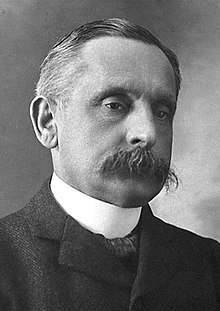Paul Henri d'Estournelles de Constant
Paul Henri Benjamin Balluet d'Estournelles (born November 22, 1852 in La Flèche ; † May 15, 1924 in Paris ), Baron de Constant de Rebecque, was the founder and president of the French Parliamentary Group on Binding Arbitration and the founder of the Defense Committee national interests and international reconciliation. In 1909 he received the Nobel Peace Prize for his work , together with the Belgian Auguste Beernaert .
life and work
Early years: training and diplomatic days
The great-nephew of the French writer Benjamin Constant was born in La Flèche near Le Mans in France . He spent his youth and school days in the Greek capital Athens , then traveled to Greece and finally studied law in Paris . He processed his experiences in books, with which he made a name for himself in France as a travel writer. In 1876 he decided to become a diplomat for France. After a two-year stay in London , he went to Tunis as embassy secretary in 1882 . He also processed his tenure there in literary terms in a book about the politics of Tunisia , which was awarded a prize by the Académie française . After this term of office he stayed briefly in The Hague , after which he returned to London in 1890, this time for eight years. Here he was first active as a delegation counselor and later as an authorized minister, after which he resigned his diplomatic post and devoted himself to politics.
Political career
In 1895, d'Estournelles was elected for the first time as a candidate for the Republican Party in the French House of Representatives and held that mandate until his death. From 1904 on he was a senator .
His peace work began in 1899 as a delegate from the French government to the first Hague Peace Conference , after which he was appointed a member of the Permanent Court of Arbitration . On several trips to the USA and various countries in Europe, he tried to spread the idea of arbitration and to convince politicians and governments of the goals. He succeeded in doing this in 1902 when he visited Theodore Roosevelt , who appealed to the Hague Arbitration Court for a legal dispute with Mexico .
In 1903, d'Estournelles founded a non-partisan parliamentary group for voluntary arbitration in France, which made a major contribution to the arbitration agreements concluded in 1903 and 1905. Above all, the Franco-English relations were promoted and improved through the essays, lectures and trips of d'Estournelles. In 1905 he founded the Committee for the Defense of National Interests and International Reconciliation , to which many leading figures from politics, culture and business came together and which was also promoted by Andrew Carnegie . In 1907 he was elected a member of the American Philosophical Society .
On his next trip to America in 1911, d'Estournelles was a guest at the establishment of the Carnegie Foundation to support international peace efforts. In the same year a European center of the foundation was set up in Paris, whose director was d'Estournelles. At the second Hague Conference and in the following years he campaigned for disarmament and an improvement in diplomatic relations with Germany, but changed his strategy with the beginning of the First World War and the invasion of Belgium by German troops . From this point on he called for a fight against German militarism and tried to convince the USA of his point of view. After the end of the war, however, he demanded a pacifist attitude towards the German people, which, in his words, was not to be equated with the government of Germany. He heavily denounced the French demands for annexation .
In the years after the war, d'Estournelles mainly worked on the French part of the League of Nations and tried to eliminate the weaknesses of this institution. He died in Paris in 1924.
literature
- Bernhard Kupfer: Lexicon of Nobel Prize Winners. Patmos Verlag, Düsseldorf 2001, ISBN 3-491-72451-1
- Adolf Wild: Baron d'Estournelles de Constant, 1852 - 1924. The work of a Nobel Peace Prize winner for Franco-German understanding and European unification. Edited by the Europa-Kolleg Foundation . Fundament Verlag Dr. Sasse, Hamburg 1973 (also Diss. Phil. University Mainz 1970 with Ferdinand Siebert )
- Laurent Barcelo, Paul d'Estournelles de Constant, l'expression d'une idée européenne , Paris, L'Harmattan, 1995, ISBN 2-7384-3767-2
- Stéphane Tison (ed.), Paul d'Estournelles de Constant. Concilier les nations pour éviter la guerre (1878-1924) , Presses universitaires de Rennes, 2015, ISBN 978-2-7535-3589-3
Web links
- Information from the Nobel Foundation on the 1909 award ceremony for Paul Henri d'Estournelles (English)
- Newspaper article about Paul Henri d'Estournelles de Constant in the 20th century press kit of the ZBW - Leibniz Information Center for Economics .
Individual evidence
- ↑ Member History: Paul Henri Benjamin Balluet d'Estournelles de Constant. American Philosophical Society, accessed June 26, 2018 .
| personal data | |
|---|---|
| SURNAME | Estournelles de Constant, Paul Henri d ' |
| ALTERNATIVE NAMES | Estournelles, Paul Henri Benjamin Balluet Balluet d ', Baron de Constant de Rebeque |
| BRIEF DESCRIPTION | Founder and President of the French Parliamentary Group on Voluntary Arbitration |
| DATE OF BIRTH | November 22, 1852 |
| PLACE OF BIRTH | La Fléche |
| DATE OF DEATH | May 15, 1924 |
| Place of death | Paris |
